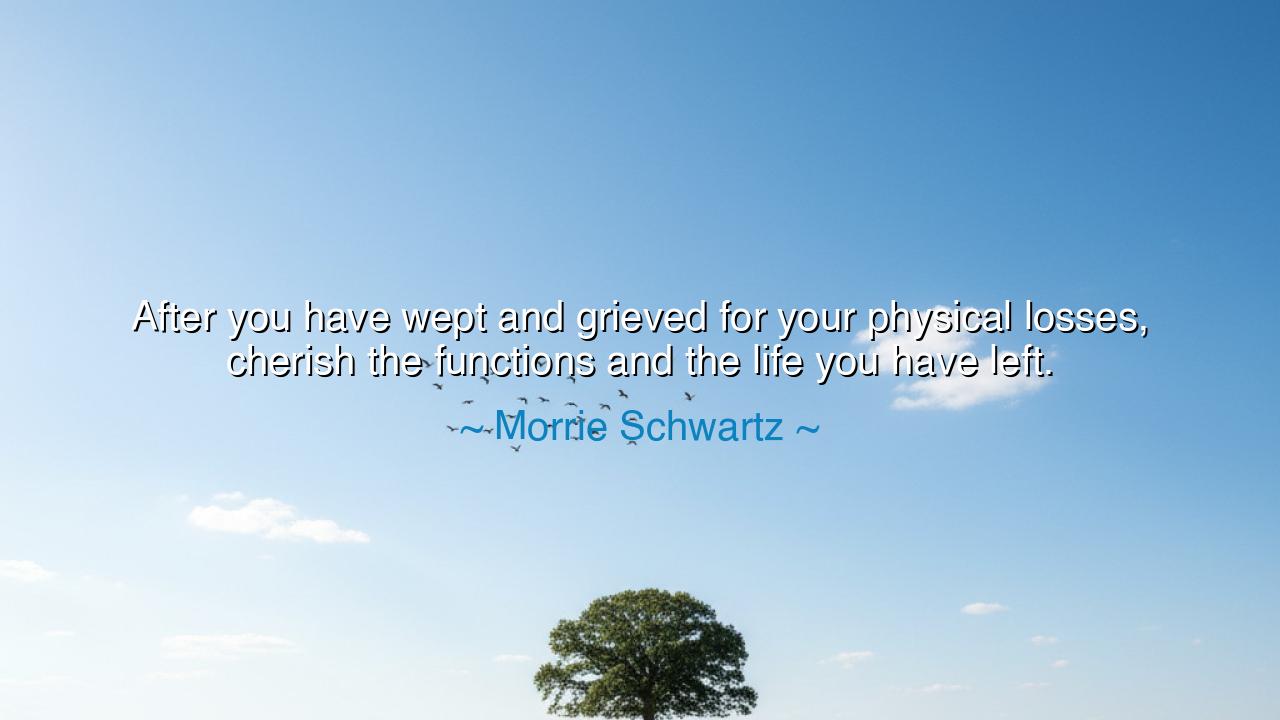
After you have wept and grieved for your physical losses
After you have wept and grieved for your physical losses, cherish the functions and the life you have left.






Morrie Schwartz, the gentle teacher whose wisdom was carried into the world through Tuesdays with Morrie, once said: “After you have wept and grieved for your physical losses, cherish the functions and the life you have left.” These words rise not from abstraction but from lived truth, spoken by a man whose body was failing him through illness. Yet, even as his flesh weakened, his spirit grew stronger, radiant with clarity. He reminds us that loss is inevitable, that the body will one day falter — but the heart, the mind, the soul still hold treasures worth cherishing.
The ancients, too, honored this wisdom. In the writings of Epictetus, the Stoic philosopher who was himself a slave with a crippled body, we hear the same truth: “You may fetter my leg, but not even Zeus has power over my will.” He, like Morrie, understood that grief for what is lost must be felt — for to deny it is to deny humanity — but that beyond the tears lies a choice: to see only the ruin, or to honor what remains. Thus, the teaching stretches across time: sorrow has its season, but life must not be abandoned while it still flows.
History gives us the story of Helen Keller. Stricken blind and deaf in infancy, her world was one of near-total deprivation. Yet, through the guidance of her teacher Anne Sullivan, she learned to touch words, to taste knowledge, to speak in her own way. She could have sunk forever in grief for what she lacked, but instead she cherished what remained: her mind, her spirit, her burning will. From her silence arose a voice that carried hope to millions. She embodied Morrie’s wisdom long before he spoke it.
Morrie’s words are not an invitation to dismiss pain, but to pass through it. “After you have wept and grieved” — he acknowledges the sacred place of tears, the necessity of mourning. To suffer loss and not grieve is to harden the heart unnaturally. But once grief has spoken, the task becomes renewal: to look upon the body, upon the breath still in the lungs, upon the love still present in relationships, and to say, “This I will cherish.” It is not denial, but transformation.
This teaching burns brightly for all who age, for all who face illness, for all who feel their powers diminish. The runner who can no longer sprint may still walk in beauty. The craftsman whose hands weaken may still teach. The mother who grows frail may still hold the warmth of family together. Morrie’s wisdom whispers: do not measure yourself only by what is gone, but by what you still can give, what you still can live.
Practical action flows from this like a river. Each day, give space to grief where it is needed — do not hide it. But afterward, seek out what still remains. Write down what you can still do, what joys you can still touch, what love you can still share. If you cannot sing, perhaps you can still speak; if you cannot speak, perhaps you can still smile; if you cannot smile, perhaps your presence alone can still be a light to another. In every loss there is a remnant of life that begs to be cherished.
So, O children of tomorrow, carry Morrie’s words in your hearts. For the day will come when you weep for what is taken from you. Let the tears fall, and honor them. But rise from your sorrow with courage, and turn your gaze to what remains. Cherish your breath, your touch, your thought, your love. For even when much is lost, life still offers itself, fragile yet radiant. And if you can cherish it, you will not merely endure your days — you will live them with the dignity and depth of one who has tasted sorrow, yet chosen joy.






AAdministratorAdministrator
Welcome, honored guests. Please leave a comment, we will respond soon